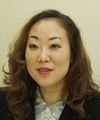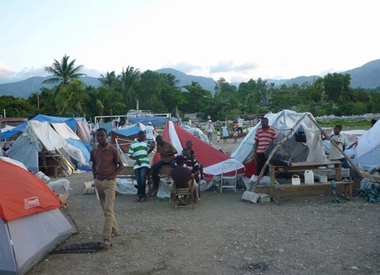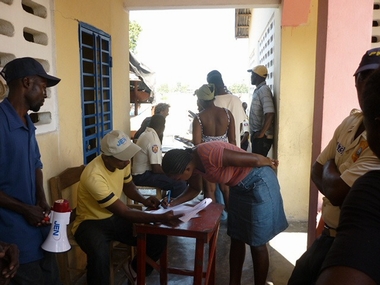ProjectsPast and current JFS projects
What Would People on Edge Want? - From the Field of International Assistance
 Copyright JFS
Copyright JFS
Japan Emergency NGOs (JEN), a Japanese humanitarian non-governmental organization, which I belong to, has started emergency relief activities in Haiti that was hit by an earthquake in January, 2010. I would like to talk about the situation there and JEN's activities that promote people's self-support as well as what I would like to ask each of you to do.
From Receiving the First News to Deciding on Sending Relief
I learned about the occurrence of earthquake in the morning of January 13 (12 local time). After the media reported that there was a major earthquake, the local situation was not available for a while. When a major disaster hits an area with a good telecommunication infrastructure, new information is usually delivered continuously. When the damage is high, the media also suffers, therefore no news comes out. We often assume that the longer it takes from the first news to the next news, the more severe the disaster damage must be.
We started many research efforts, thinking that our staff would definitely be dispatched this time, since Haiti is one of the poorest countries. We support the poorest countries not because we feel sorry for their poverty. The poorest countries are highly prone to disasters due to poor materials used for buildings and such to begin with. Even the President's office collapsed. Houses of affluent people are often of solid construction using good materials. The damage in rich neighborhood was very minor in Haiti also.
On January 14 (Japan time), the next day of the earthquake, we decided to send support to Haiti. It was important then to carefully examine if we can do meaningful activities by going into the field. JEN consists of 26 international staff members who currently work in nine countries including Haiti. We laughingly call our personnel affairs "HIJ (Hikihagashi Jinji system, meaning "ripping-down personnel system" in Japanese); " when an emergency situation occurs, we are compelled to ask those who had been on a mission somewhere else to leave the site, by ripping them down and dispatching them to a new disaster area.
Simply providing a little emergency support could mean a support that we only give. We decide on mobilization only after we find someone who can commit a long-term engagement and after we confirm that a meaningful activity should be possible with the mobilization at that moment.

Both People and Support Gather at Famous Places
First upon arrival, we start with investigation at the site. JEN's activities always start with it. One thing that becomes clear at this stage is that people gather at famous places.
I used to work in the former Yugoslavia before, and most people tell me, "So you were in Kosovo." It is because the name of Kosovo became very famous due to the NATO air strike in 1999. Obviously, Kosovo is not the only province of the former Yugoslavia.
During the Mid Niigata Prefecture Earthquakes in 2004, people often told me, "So you are in Yamakoshi village." But we didn't go to Yamakoshi. Both people and media gather at places that have become famous and consequently support will also be concentrated there. Sometimes the collected relief supplies are not fully utilized due to excessive concentration.
Surplus in one place could mean a shortage in another place. Even if the damage is as serious as the one at famous places, many places do not receive any support groups or relief supplies just because they are a little away from famous places. Those are the places we always choose.
As many as 450 groups gather and do activities everyday in Port-au-Prince, the capital of Haiti. The damage in Port-au-Prince is indeed high, but other nearby areas are also facing similar post-disaster situation. We started our activities in Grand-Goave, a town with about 115,000 people located about 50 kilometers away from the capital. In this area, about 60 percent of residents lost their houses, but no support groups were present immediately after the disaster.
Key is Community Rebuilding
In the affected area, the first thing we need to do is to secure places where refugees can sleep. We agreed to provide tools to remove the rubbles of collapsed buildings, and galvanized plates, saws, nails, hammers, timber, cotton work gloves, and others to build shelters. Those who received the supply will sign their names in the name list, and it is essential to have local people to make the name list.
Over one million people among the total population of Haiti (about nine million or nine and a half million) were affected by the earthquake. Many people died and the established communities no longer function.
A community consists of various people who play various roles. In a situation where some of them unfortunately died and many new people got together after a disaster, it is necessary to rebuild a community. A name list is part of it. In the process of making a name list, many things happen, from disagreement to soothing, but we believe that working together will result in the first step of cooperation, which is extremely important.

Wells That Promote Independence or That Increase Dependence
Let me introduce our activities from the examples other than those in Haiti. JEN always aims for promoting people's independence. We provide educational support and job training, or repair schools and dig wells, but these activities are not the purpose of our program. In case with digging wells, JEN strives to provide support to achieve independence through the opportunity such as well digging.
For instance when a NGO like us finishes digging a well, would local people say "Thank you"? If the area is heavily dependent on others, they would not show any gratitude. Sometimes they take it for granted to be helped.
During a completion ceremony of a well, a resident complained to me saying, "Please dig a well much closer to my house, too." Until then, it took two hours one way to get water from a river, and the new well made water available within a distance of 15 minutes, but they complained. They could save money by using the spare time and dig a well on their own in their neighborhood. But in a dependent situation, people can't think that way. This situation of dependence is not created by them. The dependence is generated when donors give carelessly. Therefore, they are accountable for creating dependence.
To avoid that situation, well's management committee is established in our well digging program. The committee members learn troubleshooting techniques of wells to fix them by themselves in addition to simply overseeing the proper use of wells.
Wells have huge chain-like parts. When even one link is broken, the whole well will be out of service. Therefore, the management committee is taking the lead to collect money from the users of well a little by little and save the money to buy the parts when necessary. The members need to learn about money management skills such as bookkeeping and using the saving only for stated purpose.
Thus when the well is actually broken, it can be fixed and used again by buying exchange parts at a little expense. When people realize there are things they can do, people seem to have a greater confidence in themselves. One of the maintenance committees found the maintenance of their well easy and fixed other seven broken wells in surrounding communities without being asked to. I believe independence support is to let people think with their brains, act on their own and improve their life by themselves.
This is not particularly difficult. I believe that setting the stage to accumulate small successful experiences one by one support independence.
Importance of Mental Care
Thinking positively is extremely important for people's independence. Many people are deeply depressed by losing everything in the area affected by conflicts and natural disasters. Human beings can't keep trying at a hard time even if they are told "Let's become independent" or "Quit being dependent."
An old lady I met at a conflict-laden area lost her husband and second son during the Second World War and the eldest son and the third son during the former Yugoslavian War. She said, "I am all alone in the world." When I asked her "What is your wish now?", she answered, "To die as soon as possible, even one day earlier." Someone in that kind of situation won't be able to try hard. We are doing a mental care project to increase the mental energy level enough to live with sorrow in their hearts.
There are many approaches for mental care. In Sri Lanka that was affected by tsunami in December 2004, we are doing a project for males to make fishing nets. If we only want to provide fishing nets, we can just buy and distribute them because they are inexpensive. Instead we ask them to make one by themselves as a mental care program. When people in a community meet and work together every week, they may only exchange greetings in the beginning, but gradually they start to talk about their personal experience while they make fishing nets. Those who have lost their family members and thought that no one would have understood the pain will find out about other people who are in a similar situation and become a little more positive about life. They can also support each other. Some people who attend the project said, "I can't share my suffering with my family because I am a man." Some said, "It was nice to be able to talk with other males." We also work on mental care program using different approaches such as knitting project for women.
I would like to share one important thing from the example of a man I met in Sri Lanka. He had been working away from home in Iraq until right before the tsunami attack. He worked very hard in dangerous Iraq, thinking, "If I can stand for one year, everyone in my family can have a good life." Then he retuned home and thought, "Good. Finally we can live comfortably together." Then one week later, tsunami attacked and everyone in his family was gone missing.
How can someone like him live cheerfully from the next day? He had lost his zest and energy for life, and used to spend everyday drinking and indulging in sorrow. Participating in the fishing net project didn't help lift up his feeling so easily. Then he happened to meet a boy who lost all of his family just like he did. He thought, "This boy is also all alone in the world. Maybe I should live for this boy." Gradually he started to engage in the project and support this boy and live more positively. Now he is one of the very capable leaders of JEN's fishing net project.
People Can Only Live Altruistically
We have been working in very extreme situations in various areas and saw this kind of examples in everywhere including former Yugoslavia, Afghanistan and Iraq. People may not be able to stand up for themselves under extreme situations, but may be able to do so for someone else. That must be probably in our DNA. I think human beings are altruistic animals. We can try hard for other people. Trying hard for someone makes us feel fit. I think that makes us happy.
If you want to be happy, try hard for someone else. You may think "Then what about me?" but you don't need to worry about that. Someone will do something for you. I hope you will feel at ease to contribute to others, become appreciated by others and have happy and sound life. In addition, I hope you will make the better world together. These are the things people at the disaster affected area taught me.
Profile
Keiko Kiyama, managed numerous programs, as the Regional Representative of JEN for the former Yugoslavia project from 1994 to 2000. Japan Emergency NGOs (JEN) is a Japanese humanitarian non-governmental organization, established in 1994. JEN has been working for people in need who were affected by conflicts and natural disasters. JEN's programs have been operated in various countries, namely, Afghanistan, Iraq, Eritrea, Chechnya, Pakistan, India, Mongolia, Iran, South Sudan, Sri Lanka, Myanmar and Indonesia. JEN responds to disasters not only outside, but also in Japan, such as the Mid Niigata Prefecture Earthquakes. This project still continues five years after the earthquake. Master of Arts in Sociology, State University of New York at Buffalo.


